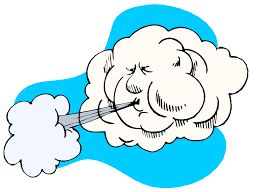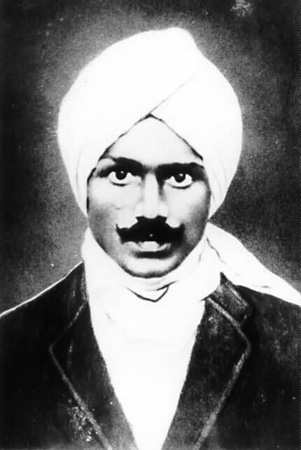Poem-2
Wind
By Subramania Bharati
[Translated from Tamil by A.K. Ramanujan]

Wind Poem Introduction
We are all aware that wind is a natural occurrence. The poet addresses the wind in this poem. Wind's power has been described, and the poet says that wind is destructive. He has linked the destructive power of wind to life's adversities and says that weak people break down, but stronger people emerge stronger from adversity. The poem conveys an important message: in order to survive life's difficulties, we must be mentally tough and physically strong. A weak person crumbles and crumbles like a weak building. With our strength and determination, we must make these destructive forces our friends.
Wind Poem Summary
The first section of the poem describes the wind's movement. The poet asks the wind blow softly. He begs the wind not to break the window shutters, scatter the papers, or knock the books off the shelf. However, the wind throws the books and tears the pages. The wind, according to the poet, mocks the weak. It brings down frail houses, sagging doors, sagging rafters, and even frail hearts. It crushes everything weak.
The poet advises us to be courageous. Only then will we be able to save ourselves from the wind. We should construct strong houses with solid doors. Our bodies and hearts must be strong as well. Kicking the weak and making friends with the strong is the way of the world. The wind extinguishes the weak fires while allowing the strong fires to roar and flourish. As a result, the poem conveys the message that no one cares about the weak. The wind is also on the side of the strong. To be successful and overcome life's challenges, we must strengthen ourselves.
Wind Poem Explanation
Wind, come softly.
Don’t break the shutters of the windows.
Don’t scatter the papers.
Don’t throw down the books on the shelf.
There, look what you did — you threw them all down.
You tore the pages of the books.
You brought rain again.
You’re very clever at poking fun at weaklings.
- poking fun: making fun of something
- weaklings: a person who is weak
The poet is having a conversation with the wind. He requests that the wind blow softly. So he's saying that the wind shouldn't be too strong or too loud. It should be gentle and understated. Then he says that the wind is very powerful and destructive, breaking window shutters and scattering papers. When the wind blows hard, all of the books on the shelf fall to the ground. So the poet is describing the power of the wind here. Then he tells the wind to look at the devastation it has caused.
When there is a strong wind, all the weak things, such as small plants, tiny children, and so on, become scared and may fall and injure themselves. We can say that the poet refers to wind as a young child in the first part of the poem. He is implying that it should be passed softly, as a small child would. Later on, we learn that the wind, like a young person, is destructive. Just like a young boy or girl who is overflowing with energy, violence, and destruction.
Frail crumbling houses, crumbling doors, crumbling rafters,
crumbling wood, crumbling bodies, crumbling lives,
crumbling hearts —
- crumbling: falling or to cause something to break
- rafter: sloping beam which supports the roof of the building
The word 'Crumbling' is repeated so many times in this scene to emphasise how everything crumbles in the face of a strong wind. So, the writer is saying that when the wind is very strong, it causes everything to break. Houses that are weak fall, doors that are weak fall, beams that support the roofs of buildings fall, all wooden structures fall, all bodies of people fall, animals, lives, and hearts fall. As a result, he says that everything crumbles. In the face of adversity, everything that is weak falls down and breaks. So the poet is saying that whenever a weak person faces adversity or a challenge in life, he crumbles and falls.
the wind god winnows and crushes them all.
- winnows: to broke grain-free of chaff, separate grain from husk by blowing on it
The poet addresses wind as 'wind god,' and he says that the powerful god of wind winnows, which means he sifts all the people, and the weak fall down and are crushed. As a result, a comparison is made between wheat and people in this context. The wind god separates the strong from the weak, just as we winnow wheat to separate the grain from the chaff. When there is a strong wind, all the weak things fall and are crushed.
He won’t do what you tell him.
So, come, let’s build strong homes,
Let’s joint the doors firmly.
Practice to firm the body.
Make the heart steadfast.
Do this, and the wind will be friends with us.
The poet wants us to make friends with the wind, i.e. the adversities in our lives. He says that the problems will not listen to us. They will come, so we should be ready. As a precaution, we should construct strong homes and securely close our doors so that the wind cannot enter. Then he says we should prepare our bodies and hearts to face these challenges. Then, when we're strong enough, all of our challenges will be like old friends. We will not find them bothersome.
The wind blows out weak fires.
He makes strong fires roar and flourish.
His friendship is good.
We praise him every day.
- flourish: grow
The poet has raised the wind to a throne. He's making a comparison between the wind and God. He says that wind is god, and we worship it every day. He goes on to say that everything that is weak dies in the face of the strong wind. And all that is strong, flourishes, and grows to become stronger. He is sending us a very important message: we should not be discouraged because we face so many challenges and adversities in life. We must prepare ourselves physically and mentally to face these challenges. And once we are strong enough, we will overcome the challenges, become friends with them, and be grateful that we had these challenges in our lives because they help us grow stronger and better.
Wind Poem Literary Devices
1. Rhyme scheme – The entire poem is written in free verse. There is no rhyme scheme in the poem.
The literary devices used are as follows –
2. Anaphora – When a word is repeated at the start of two or more consecutive lines, it is the device of Anaphora.
Lines 2, 3, 4 begin with ‘don’t’.
Lines 6, 7, 8 begin with ‘you’.
3. Personification – wind has been personified. When the poet says ‘you are’, he is referring to wind as ‘you’ that means he is treating wind as a person.
4. Repetition – ‘crumbling’ is repeated many times to lay emphasis. The poet wants to say that the wind crushes everything that is weak. That is why he repeats the word crumbling.
5. Alliteration – the repetition of a consonant sound in close connection. ‘wind winnows’.
‘won’t want’
6. Symbolism – Symbolism means that the thing refers to some other thing. the wind is a symbol. It refers to the challenges in life. He is using wind as a symbol for the adversities in our life.
About the Poet

Chinnaswami Subramania Bharathi (Bharathiyar) was a Tamil writer, poet, journalist, Indian independence activist, social reformer, and polyglot. He was a pioneer of modern Tamil poetry and was popularly known as "Mahakavi Bharathi."

 ACERISE INDIA
ACERISE INDIA
